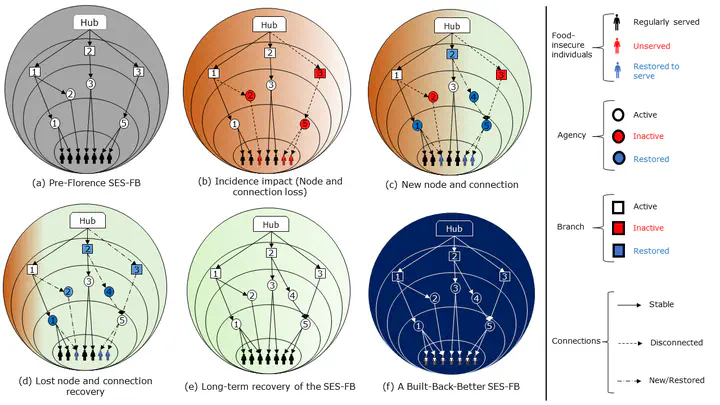Resiliency within the Socio-Ecological System of a Large Food Bank Network: Preparing, mitigating, responding, and recovering from Hurricane Florence
 A stylized representation of the disruption and recovery of FBCENC’s Socio-Ecological System in the context of Hurricane Florence
A stylized representation of the disruption and recovery of FBCENC’s Socio-Ecological System in the context of Hurricane Florence
Abstract
The network of a food bank consists of a complex web of entities. The entities may include the warehouses and charitable agencies. A food bank relies on the smooth interactions among these entities in distributing the donated food to the food-insecure population. In this study, we theorize that these entities and their complex interactions form a Socio-ecological System (SES). However, such an SES is vulnerable to disruptions, i.e., Hurricanes. In this study, we explore the behavior of the SES of our partner food bank, the Food Bank of Central and Eastern North Carolina (FBCENC), during Hurricane Florence, one of the deadliest hurricanes in the Carolinas. Specifically, we adopt a mixed-method research design to study the preparedness, mitigation, response, and recovery of the FBCENC SES over the lifecycle of Hurricane Florence. The design consists of quantitative methods (descriptive and statistical analyses), and qualitative methods (focus groups and semi-structured interviews). Our analysis reveals the preparation of the entities in terms of food flow within the SES, the impact of Hurricane Florence in terms of facility closure and inaccessibility, and the mitigation and response (studied together as “incidence”) of the entities through elevated activities, i.e, increase in received donations and distributions of relief items. Moreover, our analysis also reveals how the SES recovered through cooperation among the entities empowered by social capital. We also observe that new entities and connections were formed to recover from Hurricane Florence, providing a glimpse of how the FBCENC SES has been ”Built-Back-Better” after the hurricane.